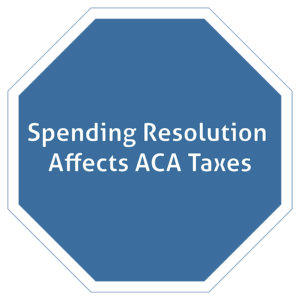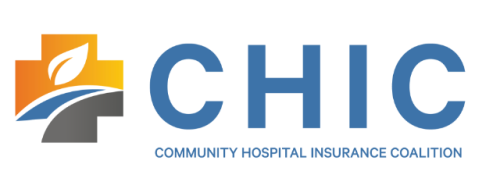IRS Adjusts HSA Contribution Limit, Provides Transition Relief for Certain Non-Compliant HDHPs
Spending Resolution Affects ACA Taxes
New Rules for Disability Claims Take Effect Soon
Webinar on FMLA: Step-by-Step Compliance Overview
Did you Know: Health and Human Services
IRS Adjusts HSA Contribution Limit, Provides Transition Relief for Certain Non-Compliant HDHPs
by Marathas Barrow Weatherhead Lent LLP, a national law firm with recognized experts on the Affordable Care Act. 
In Rev. Proc. 2018-18, the IRS has released adjusted contribution limits for health savings accounts (HSAs) due to changes made by the Tax Cuts and Jobs Act (TCJA). As shown below, the new HSA contribution limit for individuals with family high deductible health plan (HDHP) coverage is $6,850, a $50 reduction from the previously announced inflation-adjusted amount for 2018. Other HSA/HDHP figures remain unchanged.
| 2018 HDHP and HSA Limits | Single / Family |
| Annual HSA Contribution Limit | $3,450/ $6,850 |
| Minimum Annual HDHP Deductible | $1,350 / $2,700 |
| Maximum Out-of-Pocket for HDHP | $6,650 / $13,300 |
HSA Contributions in Excess of $6,850
While most employees with family HDHP coverage will not have contributed more than $6,850 through salary reductions at this point in 2018, employers will need to communicate the reduction to employees and reduce elections for employees who have elected $6,900 (and who will not be age 55 by the end of 2018). If an employer has already funded $6,900 on a non-taxable basis, they should include the additional $50 in the employee’s income and the employee may take a corrective distribution to avoid excess contribution penalties.
In most cases, the only task for employers will be to inform employees of the adjustment and, specifically, inform those who elected $6,900 (or $7,900 for employees who will be age 55+ at the end of 2018) that their election will be capped at $6,850 (as adjusted for the $1,000 catch-up).
Adoption Assistance Adjustment
The TCJA also reduces the amount that can be excluded from an employee’s gross income for the adoption of a child with special needs from $13,840 to $13,810. The phase-out also begins at a lower level than previously expected – $207,140 (reduced from $207,580) and is completely phased out for taxpayers with modified adjusted gross income of $247,140 (reduced from $247,580).
Transition Relief for Certain Non-Compliant HDHPs
In separate guidance (Notice 2018-12), the IRS provided transition relief for an issue that threatened to disrupt HSA-eligibility for individuals in states that require certain health insurance policies to provide benefits for male sterilization or male contraceptives without cost sharing (reportedly, California, Illinois, Maryland and Vermont). Under IRS rules, such coverage does not qualify as preventive when provided to males because they are not preventive care under the Social Security Act, and no applicable guidance issued by the Treasury and the IRS provides for the treatment of those benefits as preventive care. Thus, the IRS concluded that under current guidance, a health plan isn’t an HDHP if it provides benefits for male sterilization or contraceptives before the minimum deductible for an HDHP is met, regardless of whether the coverage of those benefits is required by state law. An individual who is not covered by an HDHP isn’t HSA-eligible and cannot contribute or receive employer contributions to a HSA on a tax-free basis.
The IRS understands that states may wish to change their laws in light of the Notice; however, they may be unable to do so in 2018 because of limitations on their legislative calendars or other reasons. Without relief, residents of these states would be unable to establish or contribute to an HSA on a tax-free basis unless their plan is exempt from the state mandate (e.g., they are covered under a self-insured ERISA plan). Therefore, the Notice provides transition relief for 2018 and 2019 to participants in an HDHP that provides benefits for male sterilization or male contraceptives without a deductible, or with a deductible below the minimum deductible for an HDHP. Until 2020, these individuals won’t be treated as failing to qualify as HSA-eligible individuals merely because they are covered by such an HDHP.
Spending Resolution Affects ACA Taxes

On Jan. 22, 2018, President Donald Trump signed a short-term continuing spending resolution into law to end the government shutdown and continue funding through Feb. 8, 2018. The continuing resolution impacts the following three taxes and fees under the Affordable Care Act (ACA):
- Cadillac tax
- Health insurance providers fee
- Medical device excise tax
Cadillac Tax
The ACA imposes a 40 percent excise tax on high-cost group health coverage, also known as the “Cadillac tax.” The resolution delays implementation of the Cadillac tax for two years, until 2022. There is some indication that the two-year delay will lead to an eventual repeal of the tax altogether.
Health Insurance Providers Fee
Beginning in 2014, the ACA imposed an annual, nondeductible fee on the health insurance sector, allocated across the industry according to market share. The resolution provides an additional one-year moratorium on the health insurance providers fee for the 2019 calendar year. However, it specifically declines to extend the moratorium through 2018. Therefore, the fee continues to apply for the 2018 calendar year.
Medical Device Excise Tax
The ACA also imposes a 2.3 percent excise tax on the sales price of certain medical devices, effective beginning in 2013. The continuing resolution extended a moratorium on collection of this tax for an additional two years, through the 2019 calendar year. As a result, the medical devices tax will not apply to any sales made between Jan. 1, 2016, and Dec. 31, 2019.
Next Steps
Employers should be aware of the evolving applicability of existing ACA taxes and fees so they know how the ACA affects their bottom lines. HealthSure Insurance Services, Inc. will continue to keep you informed of changes.
New Rules for Disability Claims Take Effect Soon

On Jan. 5, 2018, the Department of Labor (DOL) announced that, effective April 1, 2018, employee benefit plans must comply with new requirements for disability benefit claims.
In 2016, the DOL released a final rule to strengthen the claims and appeals requirements for plans that provide disability benefits and are subject to the Employee Retirement Income Security Act (ERISA). On Nov. 24, 2017, the DOL delayed the final rule for 90 days—until April 1, 2018—to give stakeholders the opportunity to submit comments on the final rule’s benefits and costs.
ERISA plans that include disability benefits must comply with the new procedural protections, effective for claims that are submitted after April 1, 2018. Entities that administer disability benefit claims, including issuers and third-party administrators, will need to revise their claims procedures to comply with the final rule.
Webinar on FMLA: Step-by-Step Compliance Overview
Many employers are overwhelmed by the changing legal requirements that affect their workplaces. To help you navigate these rules and regulations, you are invited to attend a webinar that will answer your questions on the Family Medical Leave Act.
This webinar will provide information about employer obligations under the FMLA. Employers can avoid common problems by understanding the FMLA’s leave requirements and implementing the correct administrative procedures. The webinar is presented by attorneys and will address frequently asked questions. Space is limited!
Date: April 18, 2018
Time: 1:00 – 2:00 p.m. Central time
If you are interested in attending this exclusive event, please complete the following steps to register:
- Before you register, be sure that is on your email’s safe senders list.
- Click HERE to register and complete the required fields.
- You will be sent a confirmation email with the webinar login credentials. Please save that email.
- To attend the presentation, open your confirmation email and follow the instructions. Please log in prior to the session start time to ensure timely telephone and computer connections.
Please contact your account manager with any questions.
At his swearing-in ceremony, new Secretary of the Department of Health and Human Services, Alex Azar, stated that bringing the price of prescription drugs down and tackling the opioid crisis are two topics he will focus on.
While there are no specifics on how he and President Donald Trump plan to do this, we will continue to monitor the issue and provide updates as possible.



